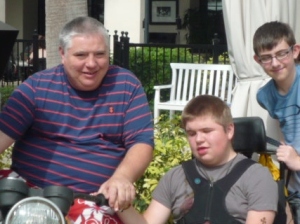What it is like to be Matthew’s dad
I have to be on call for Matthew 24 hours a day. For example, if he puts his arms over his head when he is asleep, he can’t put them back straight by himself, so he will call me during the night to ask me to help him. He often needs to call me to help with going to the loo.
In the morning, it takes about two hours to get Matthew washed, dressed and to have his breakfast. All meals take about an hour. He can still feed himself, but sometimes needs help because his arms and hands get tired. He has a neater-eater but wants to be independent for as long as possible.
Whenever Matthew is visiting we have to anticipate his needs – for example we make sure everything is put away to make room for his wheelchair. Visits have to be well-planned. When we go out for a meal, we don’t check out the menu first – we have to choose somewhere that is wheelchair friendly, and we can only go to see films if they are on in an accessible cinema. There are lots of shops that we can’t get into, especially the small local shops, but I don’t like to leave Matthew outside on his own. Although he is 14 he is vulnerable because of his condition.
Getting around is difficult. We often have to go quite a long way out of our way to find a dropped kerb that the wheelchair can cope with. Going anywhere by public transport is practically impossible – he can’t get onto coaches, there are hardly any taxis that will take a powered chair, and although (with planning) he could travel by train, not everywhere we want to go is near a railway station.
So, living with Matthew is complicated and takes a lot of forward planning, but underlying all the practical difficulties is the knowledge that we are watching him die. His deterioration is so gradual that you don’t notice it day by day, but if you compare what he can do now with what he could do six months ago, or a few years ago, it really hits you hard.Although watching him deteriorate, and knowing what the eventual outcome will be, is heartbreaking, I have to hide all the pain from Matthew, and carry on as normal. I feel that it is my responsibility to make sure that Matthew does as many different things as possible while he is still able to do them. This is why I try to raise money to take him on holiday and take him on days out, but unfortunately I also have to ask for money to help me with Matthew’s day-to-day needs. This is partly because Matthew has two homes, and his disability living allowance goes to pay for the things he needs at his mum’s, but not for what I need to have him to stay here, but is also because he needs help over and above what the authorities will pay for (his Neater-eater, for example). I am determined that Matthew will be able to visit me just as any able-bodied son would be able to. Even though I am not with his mum any more, I am still Matthew’s dad, and if I was unable to have him to stay with me I would feel that I had abandoned him.
Matthew compares the effects of his condition with a rechargeable battery. When he goes to bed, he recharges and has strength in his muscles. As the day goes on, he loses that strength, but the trouble with rechargeable batteries is that over time they get so that they won’t charge up fully, and that is what is happening to Matthew. Now he is finding that he is stiff in a morning when he wakes up – he has even started asking for his physiotherapy. I guess what he needs is new batteries, or to put it another way, he needs a treatment that would stop him deteriorating further – and he needs it now!
I am angry that Matthew is having to suffer for something that is not his fault, that he hasn’t brought upon himself, but there doesn’t seem to be enough money to help him fight and get through it, but other people, such as drug addicts and criminals, get the benefit of all sorts of treatments and rehabilitation, when they really have had the choice about how their lives have gone. If they could live in Matthew’s shoes for a short time, they would think twice about the abuse they are subjecting their own bodies to.
Matthew and I have been involved in campaigning for Action Duchenne for a number of years now. We have had some successes – being talked about in Parliament, getting a grant from the Department of Health to pay for early trials for the MDEX (exon-skipping) treatment and just getting people to know about Duchenne muscular dystrophy and what it involves. We have also been overwhelmed by the level of support we have received from people we have met – MPs, people wanting to do sponsored walks and marathons, musicians, a traffic warden with a villa in Florida, a social club in Wales, not to mention all the people we have met when we have staged events or have been collecting at the Motorway services. The trouble is that even though we have so much support and good will, it is not enough to ensure that we can beat this disease before it is too late for Matthew. He is already three quarters of the way through his life, and I reckon he has already lost three quarters of his muscle function.
I found this on my computer when I was looking for someone else. I hope it goes some way to helping you to understand what it is like to have a Duchenne boy in the family.
